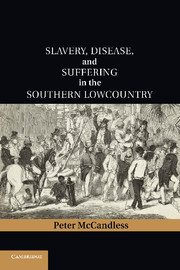Book contents
- Frontmatter
- Contents
- List of Figures
- List of Maps
- Preface
- Acknowledgments
- List of Abbreviations Used in Notes
- MAP 1 The Lowcountry, Charleston, and the Caribbean region
- MAP 2 The South Carolina lowcountry, showing Anglican parishes and slave proportion of population, c. 1760s
- MAP 3 Charleston Harbor, based on a British map, c. 1780
- MAP 4 The Revolutionary War in the South
- PART I TALK ABOUT SUFFERING
- PART II COMBATING PESTILENCE
- 8 “I Wish That I Had Studied Physick”
- 9 “I Know Nothing of this Disease”
- 10 Providence, Prudence, and Patience
- 11 Buying the Smallpox
- 12 Commerce, Contagion, and Cleanliness
- 13 A Migratory Species
- 14 Melancholy
- Bibliography
- Index
- References
10 - Providence, Prudence, and Patience
Published online by Cambridge University Press: 03 May 2011
- Frontmatter
- Contents
- List of Figures
- List of Maps
- Preface
- Acknowledgments
- List of Abbreviations Used in Notes
- MAP 1 The Lowcountry, Charleston, and the Caribbean region
- MAP 2 The South Carolina lowcountry, showing Anglican parishes and slave proportion of population, c. 1760s
- MAP 3 Charleston Harbor, based on a British map, c. 1780
- MAP 4 The Revolutionary War in the South
- PART I TALK ABOUT SUFFERING
- PART II COMBATING PESTILENCE
- 8 “I Wish That I Had Studied Physick”
- 9 “I Know Nothing of this Disease”
- 10 Providence, Prudence, and Patience
- 11 Buying the Smallpox
- 12 Commerce, Contagion, and Cleanliness
- 13 A Migratory Species
- 14 Melancholy
- Bibliography
- Index
- References
Summary
Infidelity, profaneness, heresy, blasphemy, and the most offensive breaches of common morality, have scarce ever appeared with more insolence in that province, and tho' for these things the Lord does yearly visit, sending pestilential diseases among men and beasts, which yearly sweep away numbers of both, yet none regard those things.
Levi Durand, 1747I did perceive that the fever and agues were generally gotten by carelessness in their clothing, or intemperance…. What I write is not to encourage any to depend upon natural causes, but prudently to use them with an eye to God, the Great Lord of the universe and dispenser of human affairs.
John Archdale, 1707PROVIDENCE
In late November 1774, a delighted George Ogilvie wrote from Myrtle Grove plantation that his overseer's three-year-old son was “running about in his shirt rejoicing that the frost has killed the mosquitoes.” Only the day before, the mosquitoes had been as thick as during the summer. Several earlier frosts had not “been severe enough to destroy these Devils in miniature.” Neither Ogilvie nor anyone else at the time realized that mosquitoes were more than a source of annoyance and red, sometimes agonizingly itchy bumps. But many people noticed that frost killed more than mosquitoes. If hard enough, it ended the seasonal reign of fever. Many people looked forward to “Dr. Frost” with pleasure. He might arrive later in some years than expected, but unlike the local doctors, his prescriptions were always effective.
- Type
- Chapter
- Information
- Slavery, Disease, and Suffering in the Southern Lowcountry , pp. 188 - 203Publisher: Cambridge University PressPrint publication year: 2011

